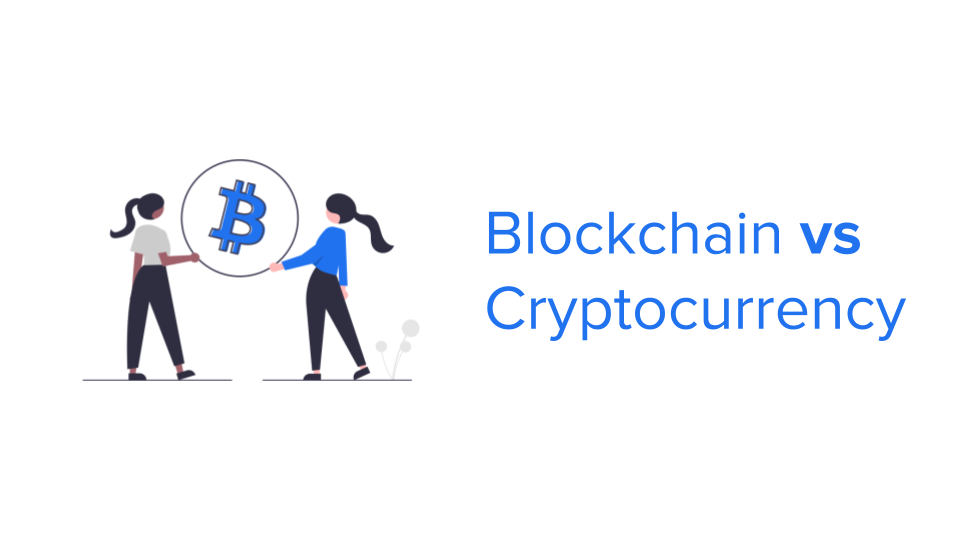Blockchain and cryptocurrencies are two terms often used interchangeably. However, there is a big difference between the two. Cryptocurrencies are digital currencies that use blockchain as a ledger for storing records of crypto transactions. However, blockchains have many uses beyond cryptocurrencies, including storing and accessing medical data, supply chain and logistics information, and financial records.
What is Blockchain?
A blockchain is a collection of records or an electronic database, like a spreadsheet. A blockchain holds larger amounts of information, such as cryptocurrency transaction records, stored in “blocks” or groups, unlike a regular spreadsheet.
These blocks are distributed across multiple computers or a “distributed ledger.” Once each block reaches its storage limit, it is “chained” to a block filled previously, and a new block comes into use.
What is Cryptocurrency?
Cryptocurrency is digital money with market value like other currencies. Cryptocurrencies can also be used as a store of value like gold. The first cryptocurrency was Bitcoin which pioneered blockchain technology.
Subsequently, other cryptocurrencies, such as Ether, came up with their own blockchains (known as Ethereum).

Similarities Between Blockchain and Cryptocurrency
Intangible
Both blockchain and cryptocurrencies are intangible. Cryptocurrencies are intangible digital tokens, which you cannot hold physically like the US dollar or the Indian rupee. The blockchains used for storing cryptocurrencies do not exist in a single place or one physical data centre.
Advanced
Both blockchain and cryptocurrencies are technological advancements. Blockchain is the underlying technology behind cryptocurrencies. Blockchain is much more advanced and secure than traditional databases. Cryptocurrencies are technologically advanced than physical or paper-based currencies.
Interdependent
Blockchain came into existence to record transactions of bitcoin, the world’s first cryptocurrency. All major cryptocurrencies have blockchains for recording transactions. If someone buys a new bitcoin, it is recorded in a bitcoin blockchain.

Differences Between Blockchain and Cryptocurrency
Inherent Nature
Blockchain is a storage technology used for saving data on decentralized networks. Cryptocurrency is a medium of exchange like the US dollar. A blockchain can be used for storing different types of information beyond cryptocurrency transaction records.
Monetary Value
All cryptocurrencies have a monetary value. You must have heard of Bitcoin hitting a high of 65,000 dollars (around 48 lac rupees) or Ether reaching 4,000 dollars (about 3 lac rupees). A blockchain does not have any monetary value.
Usage
Blockchain technology has uses beyond cryptocurrencies. Blockchain can be used for recording transactions in banking, healthcare, supply chain, and retail. Cryptocurrency is digital money, which can be used for buying goods and services and for investment.
Mobility
Blockchain technology is decentralized and distributed all over the world. There is no single location where all records of a blockchain are stored. Cryptocurrencies, although held in blockchains, can be accessed via mobile wallets. If you have a bitcoin wallet, you can use it anywhere for transacting with parties accepting bitcoins.
Transparency
Blockchain, being a public ledger, is highly transparent. Anyone can join a blockchain network and view the information available. On the other hand, cryptocurrencies offer anonymity. So, while anyone can see the source/destination of a bitcoin transaction, no one can know who is behind the transaction.
FAQ on Blockchain vs Crypto
Can blockchain exist without crypto?
Yes, blockchain can exist independently of crypto. While crypto assets rely on blockchain technology for secure transactions, blockchain can be used for a wide range of applications beyond crypto assets.
Are all crypto assets built on blockchain?
No, not all crypto assets are built on blockchain technology. Some crypto assets, known as tokenized assets, are built on other types of distributed ledger technologies or platforms.
Can blockchain technology be modified?
Yes, blockchain technology can be modified and adapted to suit specific requirements. There are different types of blockchains, including public, private, and consortium blockchains, each with its own characteristics and levels of customization.
Are all blockchains decentralized?
No, not all blockchains are decentralized. While decentralization is a fundamental characteristic of many public blockchains, there are also private and consortium blockchains that operate under the control of specific entities or organizations.
Can blockchain and crypto be regulated?
Regulation of blockchain and crypto varies across different jurisdictions. Some countries have implemented regulations to govern crypto transactions and exchanges, while others are still developing frameworks to address emerging technology.
What are some real-world applications of blockchain beyond crypto assets?
Blockchain technology has found applications in various industries, including supply chain management, healthcare, identity verification, intellectual property protection, and more. Its transparent and tamper-proof nature makes it ideal for enhancing trust and efficiency in complex systems.
Can you invest in blockchain without buying crypto assets?
Yes, you can invest in blockchain without buying crypto. Blockchain technology has applications beyond crypto assets, and there are opportunities to invest in companies or projects that utilize blockchain in various industries such as supply chain management, finance, healthcare, and more. Investing in blockchain-focused companies or blockchain-based funds allows you to participate in the growth of the technology without directly purchasing crypto assets.
Does every blockchain have a coin?
Not every blockchain has a native crypto. While crypto assets are commonly associated with blockchain technology, they are not obligatory. Blockchains can serve various purposes without a native coin, such as data storage or smart contracts. However, popular blockchains like Bitcoin and Ethereum do have native coins that facilitate transactions and incentivize network participants.

